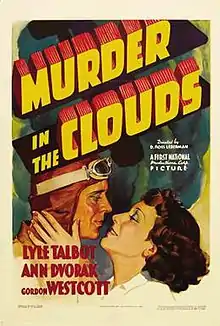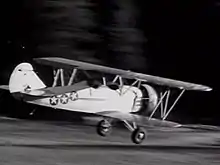Murder in the Clouds
Murder in the Clouds is a 1934 American action film dealing with aviation. The film stars Lyle Talbot and Ann Dvorak, and is directed by D. Ross Lederman. Although standard formula "B" film fare, it was notable as the screenplay and original story was written by Dore Schary as a freelance writer, during one of his periods when he was fired from a more prestigious film job. Schary was a director, writer, producer and playwright who later became head of production at Metro-Goldwyn-Mayer, and eventually president of the studio.[3] Equally important on Murder in the Clouds was the work of Elmer Dyer who had become a preeminent aviation cinematographer.[1][4]
| Murder in the Clouds | |
|---|---|
 Theatrical poster | |
| Directed by | D. Ross Lederman |
| Written by |
|
| Produced by | Samuel Bischoff |
| Starring | |
| Cinematography |
|
| Edited by | Thomas Pratt |
| Music by |
|
Production company | |
| Distributed by | Warner Brothers |
Release date |
|
Running time | 61 minutes |
| Country | United States |
| Language | English |
| Budget | $84,000[2] |
| Box office | $351,000[2] |
Plot
Trans-America Air Lines pilot "Three Star" Bob Halsey (Lyle Talbot) is in love with stewardess Judy Wagner (Ann Dvorak), but she wants him to stop his daredevil ways. So does his boss, Lackey (Charles C. Wilson). Confident in his abilities and knowing that he is the airline's best pilot, he pays neither any mind.
Federal agent Brownell (Henry O'Neill) urgently requests Lackey's cooperation: Clement Williams (Edward McWade) must be flown from Los Angeles to Washington, D.C., with a cylinder full of a revolutionary new explosive he has invented. However, Lackey's assistant Jason (Arthur Pierson) is eavesdropping on him for Taggart (Russell Hicks), a spy.
He eavesdrops again when Lackey chooses Bob as pilot and Judy's brother Tom (Robert Light) as co-pilot. Taggart sends three men to provoke Bob into a fistfight. While Bob is knocked out, another pilot, George Wexley (Gordon Westcott), chats casually with Tom, "learns" that Bob is late for the special trip, and offers to protect Bob's job by taking over.
Over the lower Sierras, the Ford Trimotor airliner explodes.
Bob and Lackey fly to the crash site and talk to Brownell. Tom's cap is there. Back in Los Angeles, they report that there are no survivors.
Frantic for news of her brother, Judy drives to the site before they return, evading the police roadblock. She is recognized by Jason, who is traveling with the spies to a nearby house they are using. Improvising a plan, they pose as federal agents and stop her.
At the house she is surprised to see Wexley, who tells her the saboteur ordered him and Tom to parachute out, then set a bomb and himself parachuted out with the cylinder—all nearly true, except that Wexley was the saboteur and Tom is dead. They want to hide the cylinder in Judy's car and trick her into driving to Mexico, so Wexley says that Tom has gone to Tijuana to identify a suspect. She agrees to leave in the morning. But then the radio reports the recovery of Tom's body. Realizing her predicament, Judy pretends not to have heard. That night, finding some paint, she paints Bob's three-star personal logo on the porch roof of the house.
Next day, back at Los Angeles, Bob learns Jason has left the office—with the three men who knocked him out. He and Lackey then discover Jason's eavesdropping device. Bob flies back to the crash area. As his co-pilot he takes Wings, who works as the airline's mechanic because when he got his pilot's license he learned he was afraid to fly. They see the three stars and land.
Bob tells Wings that if there is any sign of trouble he must fly away and alert the Air Patrol. When shots are fired, Wings does just that—not seeing Bob and Judy running for the plane. The spies capture them both.
Wexley and Taggart depart in Wexley's armed biplane, taking Judy and the cylinder. Wings then arrives with the Air Patrol, who capture the rest of the gang after a brief gunfight.
In a dogfight between biplanes, Taggart is killed but the Air Patrol plane is shot down. Now rescued, Bob takes off with Wings. He finds Wexley's plane and executes risky maneuvers to force him to land. Wexley tries to run away and Wings throws a rock at him. Both Judy and the cylinder are recovered.
Although the government is grateful, all that Judy and Bob want to do is get married.
Cast
As appearing in Murder in the Clouds, (main roles and screen credits identified):[5]
|
|
Production

Principal photography took place primarily at the Glendale Grand Central Air Terminal and airport, in the Warner Bros. studio, and at Big Bear Lake, California, from August 27 to September 15, 1934.[7] The aircraft used included a Ford Trimotor and Travel Air Speedwings.[8] Much of Dyer's aerial photography in Murder in the Clouds would be reused in future Warners programmers such as Fly-Away Baby and Fugitive in the Sky.[9]
The two leads, Dvorak and Talbot were considered difficult by mainline studios; Talbot was actively involved in the Screen Actors Guild while Dvorak was known to advocate for equitable pay for actors.[1]
Soundtrack
- "I'll String Along with You" (Music by Harry Warren)
- "Without That Certain Thing" (Written by Max Nesbitt and Harry Nesbitt)
Reception
Murder in the Clouds was both handicapped and praised for its brevity and breeziness. As a "B" film, it was one of a score of aviation-themed films that appeared in quick succession, and had many similarities. By 1934, the film industry became more safety-conscious, with screen air crashes largely being abandoned as more civil aviation topics replaced the usual World War I air battles.[10] A more contemporary review notes "a predictable and formulaic film. Clouds also – and this is also not rare in these knock-offs – suffers from plot holes you could fly an airplane through. In other words, the script is a lot of hooey" [11]
Box Office
According to Warner Bros records the film earned $244,00 domestically and $107,000 internationally.[2]
References
Notes
- Studio writer Roy Chanslor was teamed with Schary in recycling a typical Warners script.[1]
- Using the screen name, Gordon Elliott, Wild Bill Elliott who later gained fame as a western hero in a score of films and on television, during the 1930s, appeared in hundreds of B films.[6]
Citations
- Miller, Frank. "Articles: Murder in the Clouds." Turner Classic Movies. Retrieved: July 12, 2013.
- Warner Bros financial information in The William Shaefer Ledger. See Appendix 1, Historical Journal of Film, Radio and Television, (1995) 15:sup1, 1-31 p 16 DOI: 10.1080/01439689508604551
- Erickson, Hal. "Dore Schary." The New York Times, 2010. Retrieved: July 13, 2013.
- Wynne 1987, p. 16.
- "Credits: Murder in the Clouds (1934)." IMDb. Retrieved: July 12, 2013.
- Anderson, Chuck. " 'Wild Bill' Elliott." The Old Corral. Retrieved: July 12, 2013.
- "Original Print Information: Murder in the Clouds." Turner Classic Movies. Retrieved: July 12, 2013.
- "Murder in the Clouds." Aerofiles, 2007. Retrieved: July 12, 2013.
- "Murder in the Clouds" allmovie.com. Retrieved: July 12, 2013.
- Farmer 1984, p. 4.
- Butler, Craig. "Murder in the Clouds: Critics' Reviews." MSN Entertainment. Retrieved: July 12, 2013.
Bibliography
- Farmer, James H. Broken Wings: Hollywood's Air Crashes. Missoula, Montana: Pictorial Histories Pub Co., 1984. ISBN 978-0-933126-46-6.
- Wynne, H. Hugh. The Motion Picture Stunt Pilots and Hollywood's Classic Aviation Movies. Missoula, Montana: Pictorial Histories Publishing Co., 1987. ISBN 0-933126-85-9.
External links
- Murder in the Clouds at the TCM Movie Database
- Murder in the Clouds at IMDb
- Murder in the Clouds at AllMovie
- Murder in the Clouds at the American Film Institute Catalog
- Murder in the Clouds is available for free viewing and download at the Internet Archive